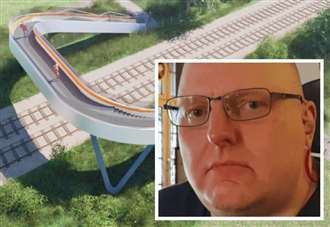Campaigners have slammed plans for a “groundbreaking” footbridge over a railway line which will be inaccessible to disabled people.
The structure is due to replace a pedestrian crossing between two housing developments in Kennington, Ashford – Crown Hill View and Conningbrook Lakes.

Revised plans for the 8.5m stepped-only ‘flow’ bridge were approved by Ashford Borough Council (ABC) last month.
An initial bid for a ramped crossing was approved at the site in September 2023, but was withdrawn in the spring amid fears the design would be too expensive.
The bridge will be built by Network Rail, but funded by housebuilder Barratt Redrow and developer Quinn Estates, which is behind the 725-home Crown Hill View development.
It will mean the existing Cradle Bridge Crossing will close, while a similar crossing several hundred metres away, called Bolleaux Crossing, will also be decommissioned.
But speaking to the Disability News Service website, access campaigner Doug Palley said he has told Kent County Council (KCC) he will seek a judicial review if the authority does not meet its Equality Act duties and oppose the application to divert the public right of way from the level crossing to the new bridge.


The council holds the final sign-off on changes to the public right-of-way, with the decision now referred to a member panel of its regulation committee.
Mr Palley added: “It is unacceptable that you [KCC] appear unconcerned at the diversion of public paths over step-only footbridges for the sake of saving Network Rail and the developers’ money, thus baking in inaccessibility for decades to come.”
A spokesman for South Eastern Railway – an organisation formed this year by the merger of Network Rail and operator Southeastern – stated the original plan for a ramped footbridge was dropped due to the increased costs of the scheme.
They added: “The existing foot crossing, accessed via a footpath and a pair of stiles, was not suitable as the developments meant that increasing numbers of people would have to walk across the live railway.


“Due to the increased costs of their scheme, we were instead approached by the developers to see if we could fund it.
“We were unable to do this, so we undertook a diversity impact assessment, which found that a stepped footbridge was the right option based on the existing stiled crossing and unmade footpaths.”
But wheelchair user Christiane Link, a consultant and adviser on accessibility, branded the plans an “appalling contradiction of promises on accessibility and equity”.
She also highlighted Network Rail’s “recent track record of building footbridges across the UK that exclude disabled people entirely”.
Ms Link added: “Network Rail’s reliance on cost savings all the time, as well as the claim that future upgrades might someday provide lifts, simply bakes in inaccessibility for decades.

“It tells disabled people they’re an afterthought, only to be accommodated if funds miraculously appear or pressure mounts.
“Research consistently shows that truly accessible infrastructure delivers significant health, environmental, and mobility benefits, reducing congestion and boosting local economies for all.”
Previously, a spokesman for Quinn Estates branded the new scheme “an exemplar, groundbreaking, cost-effective solution,” stating it would provide the template for other parts of the country where footbridges require replacement.
Cllr Linda Harman, ABC’s cabinet member for planning, shared the frustration of campaigners but noted the footbridge would be an improvement on the existing crossing.
The Ashford Independent representative for Saxon Shore ward said: “We share your disappointment that the railway bridge is unable to proceed as originally presented, but, with the build cost having exceeded the available section 106 funding, a pragmatic solution had to be found for all parties.

“The change in bridge design will impact parents with infants in prams and pushchairs, as well as wheelchair users and those with mobility impairment.
“The flow bridge proposed by National Rail is not a perfect solution, but it is much better than the dangerous current crossing.
“With major development on both sides of this outdated railway crossing bringing lots of families into the area, it is vital that a safe crossing is put in place as soon as possible.”
KCC confirmed it is currently processing an application from Network Rail to divert two public footpaths on the grounds of rail safety.
A spokesman added: “In light of concerns raised regarding accessibility, a decision on whether to proceed will be referred to a member panel of the KCC regulation committee.

“This process ensures that all relevant issues, including those raised by access campaigners, are considered transparently and fairly.
“At present, a date for the panel has not been confirmed.
“KCC is committed to ensuring that all public rights of way decisions are made with full consideration of all relevant matters.”
Find out about planning applications that affect you by visiting the Public Notice Portal.
South Eastern Railway was formed in June, combining the management of Network Rail and Southeastern as part of the government’s Great British Railways project – a public sector body that will oversee Britain’s rail infrastructure and train operation.
Barratt Redrow and Quinn Estates were contacted for comment.
